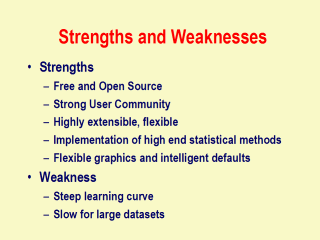 |
R is a great
software. It is freely distributed (free both in price as well as in freedom
of usage, no restrictions). It has a very strong user community who are
ready to help newbies and share information. It has extensive documentation.
Best of all, it is extremely scalable, meaning from very low end to very
high end, all types of statistical methods can be easily implemented using
R. The graphics of R are very flexible and there are many intelligent
defaults. Intelligent defaults mean R can guess what you are trying to do
and act accordingly.
On the downside, it can be time-consuming to learn to use it effectively.
The learning process is slow, sometimes frustrating, but in the end, it is a
rewarding experience. However, for very large datasets, R can sometimes be
slow, but there are several ways to speed up R. The newer versions are
invariably faster than the older ones, so continuous upgrading of the
software is a good way to speed things up. |
